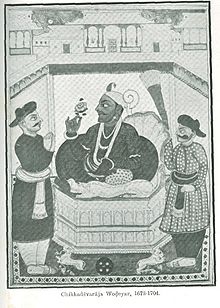Chikka Devaraja Wodeyar
| Chikka Devaraja | |
|---|---|
| Maharaja of Mysore | |
 |
|
| 14th Maharaja of Mysore | |
| Reign | 1673–1704 |
| Predecessor | Dodda Kempadevaraja (paternal uncle) |
| Successor | Kanthirava Narasaraja II (son) |
| Born | 22 September 1645 |
| Died | 16 November 1704 |
| Issue | Kanthirava Narasaraja II |
| House | Wodeyar |
| Father | Dodda Devaraja |
Devaraja Wodeyar II (Chikka Devaraja Wodeyar; 22 Sept 1645 – 16 Nov 1704) was the fourteenth maharaja of the Kingdom of Mysore from 1673 to 1704. During this time, Mysore saw further significant expansion after his predecessors. During his rule, centralised military power increased to an unprecedented degree for the region.
Chikka Devaraja was born on 22 September 1645, the eldest son of Maharani Amrit Ammani and Dodda Deva Raja (Devaraja Wodeyar I's elder brother), who had been the governor of a Mysore Kingdom town. He succeeded his uncle, Devaraja Wodeyar I upon the latter's death on 11 February 1673. He was installed on the Mysore throne on 28 February 1673. He continued his predecessor's expansion by conquering Maddagiri, thereby making Mysore contiguous to the Carnatic-Bijapur-Balaghat province administered by Venkoji, the Raja of Tanjore, and Shivaji's half-brother.
In the first decade of his rule, Chikka Devaraja introduced various petty taxes that were mandatory for the peasants, but those from which his soldiers were exempted. The unusually high taxes and the intrusive nature of his regime created wide protests in the ryots which had the support of the Jangama priests in the Virasaiva monasteries. According to (Nagaraj 2003), a slogan of the protests was:
"Basavanna the Bull tills the forest land; Devendra Indra gives the rains;
Why should we, the ones who grow crops through hard labour, pay taxes to the king?"
According to unverified sources, the king, resolving upon a treacherous massacre, used the stratagem of inviting over 400 priests to a grand feast at the famous Shaivite centre of Nanjanagudu, and upon its conclusion having them first receive gifts and then exit one at a time through a narrow lane, whereupon his royal wrestlers strangled each exiting priest. This 'sanguinary measure' had the effect of stopping all protests to the new taxes. Around this time, in 1687, Devaraja Wodeyar II also made an agreement with Venkoji to formally purchase Bangalore town for Rs. 3 lakhs.
...
Wikipedia
